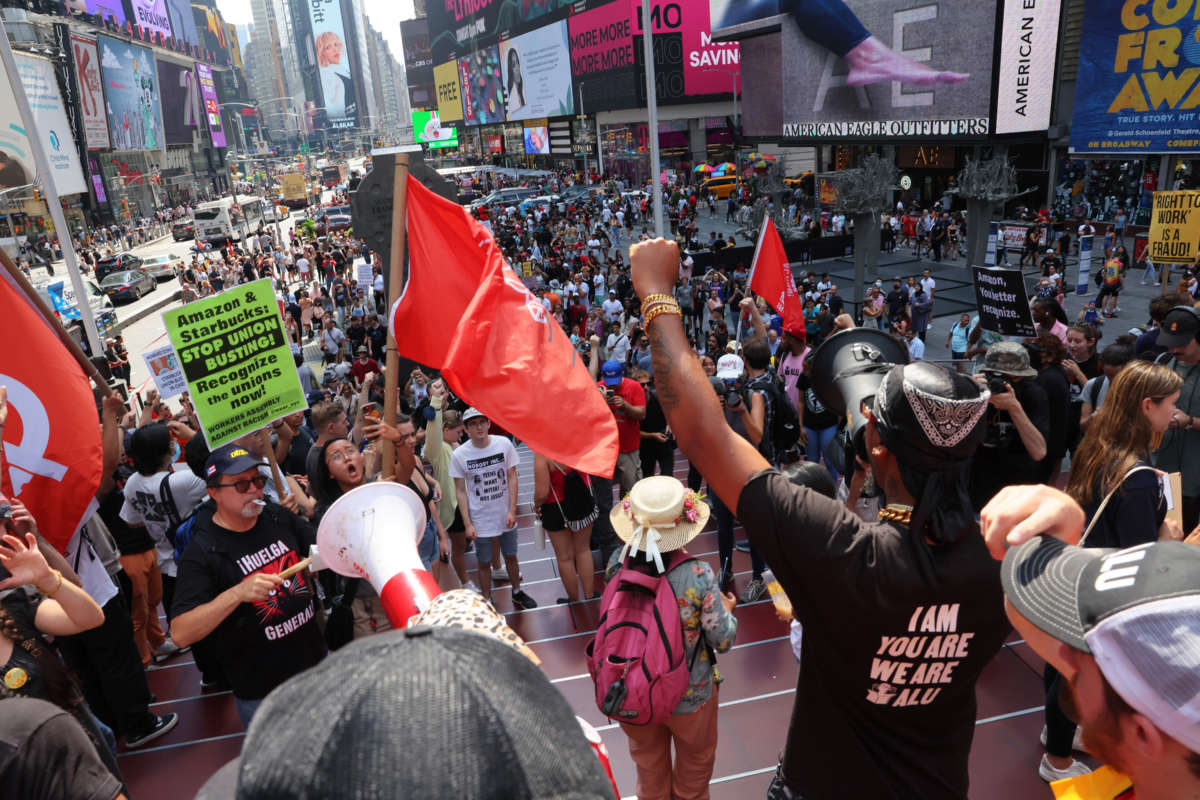Did you know that Truthout is a nonprofit and independently funded by readers like you? If you value what we do, please support our work with a donation.
New data from the National Labor Relations Board (NLRB) shows that union filings rose dramatically over the past year, hitting a six-year high and increasing by more than 50 percent over the year before.
In Fiscal Year 2022, which lasted between October 2021 and September 2022, union petition filings with the NLRB rose by 53 percent over Fiscal Year 2021. In total, workers filed 2,510 union petitions in the most recent fiscal year — the highest number of filings since Fiscal Year 2016.
The data is a show of the strong growth of the labor movement in just the past year, which has seen both the success of groundbreaking union campaigns from Starbucks and Amazon workers and also the spread of such campaigns to workers for other household name companies like Trader Joe’s, Apple and, most recently, Home Depot. Labor advocates say that workers have been more empowered amidst growing wealth inequality and runaway capitalism that has led to eroding pay and working conditions.
The NLRB reported that unfair labor practice filings, or accusations of illegal labor conduct, were also up in the most recent fiscal year. Such charges increased by 19 percent in Fiscal Year 2022, with nearly 18,000 charges filed.
Parties on either side of a labor dispute — employers or workers — can file unfair labor practice charges, but the increase could perhaps indicate an increase in workers’ willingness to stand up to illegal labor practices or union busting. In many cases, like that of Starbucks Workers United’s campaign, the vast majority of the unfair labor practice filings come from the union rather than the employer.
In all, the NLRB noted that total case intake, including union petitions and unfair labor practice filings, increased by 23 percent in Fiscal Year 2022 — the largest single-year percentage increase since Fiscal Year 1959.
Though NLRB staff have made significant progress efficiency-wise, the increase in filings is further evidence that the agency is in dire need of a funding boost, the labor board said.
The NLRB has received the same budget of $274 million for nine years. With inflation, that means that the agency has actually received a 25 percent budget cut since Fiscal Year 2014, it noted. This has led to a corresponding loss of 39 percent of staffing at the agency and 50 percent of its field office staff.
“Our field staff has done a tremendous job handling a historic surge in union election petitions and unfair labor practice charges, but this situation is unsustainable,” NLRB General Counsel Jennifer Abruzzo said in a statement. “We need Congress to provide increased funding so we can hire the staff we need and provide necessary resources to conduct hearings and elections, investigate charges, settle and litigate meritorious cases, and obtain full and prompt remedies for workers whose rights are violated.”
This uptick in cases comes during a period of critical funding and staffing shortages for the Agency.
Adjusting for inflation, the NLRB’s budget has decreased 25% since 2014. pic.twitter.com/d7B0oM02Qh
— NLRB (@NLRB) October 6, 2022
In his budget request for 2023, President Joe Biden asked for a 16 percent boost in the agency’s budget. The House included this boost in their 2023 appropriations budget draft — but although agency and labor advocates have lauded the increase, they say it is still not enough to handle the current caseload and respond to the resurgence of the labor movement.
Democrats had urged Congress to instead boost the agency’s budget to $368 million, which they say would better meet the agency’s needs. Congress has yet to come to an agreement on full year appropriations for Fiscal Year 2023.
“[W]ith 60 million non-union workers saying they would join a union if given the chance (including nearly 75 percent of young workers age 18-24), we only expect union election petitions to further increase,” Democrats wrote in a letter in April. “With this skyrocketing workload, the NLRB is now responsible for far more workers than a decade ago yet has been denied the funding to meet these statutory requirements.”
Other reports have also noted the growth of the union movement in the past year. According to data from Cornell University’s Labor Action Tracker, the amount of labor strikes held by workers between January and September of this year has already outnumbered the amount of strikes in all of 2021. With an active “Striketober” in store, the number of strikes held this year is on track to far surpass last year’s strike activity.
Media that fights fascism
Truthout is funded almost entirely by readers — that’s why we can speak truth to power and cut against the mainstream narrative. But independent journalists at Truthout face mounting political repression under Trump.
We rely on your support to survive McCarthyist censorship. Please make a tax-deductible one-time or monthly donation.
